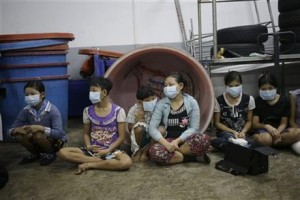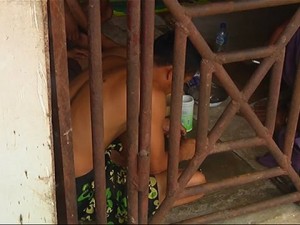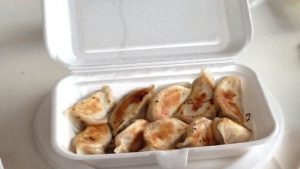An investigation by Associated Press has revealed that:
 Every morning at 2 a.m., they heard a kick on the door and a threat: Get up or get beaten. For the next 16 hours, No. 31 and his wife stood in the factory that owned them with their aching hands in ice water. They ripped the guts, heads, tails and shells off shrimp bound for overseas markets, including grocery stores and all-you-can-eat buffets across the United States.
Every morning at 2 a.m., they heard a kick on the door and a threat: Get up or get beaten. For the next 16 hours, No. 31 and his wife stood in the factory that owned them with their aching hands in ice water. They ripped the guts, heads, tails and shells off shrimp bound for overseas markets, including grocery stores and all-you-can-eat buffets across the United States.
After being sold to the Gig Peeling Factory, they were at the mercy of their Thai bosses, trapped with nearly 100 other Burmese migrants. Children worked alongside them, including a girl so tiny she had to stand on a stool to reach the peeling table. Some had been there for months, even years, getting little or no pay. Always, someone was watching.
No names were ever used, only numbers given by their boss — Tin Nyo Win was No. 31.
Pervasive human trafficking has helped turn Thailand into one of the world’s biggest shrimp providers. Despite repeated promises by businesses and government to clean up the country’s $7 billion seafood export industry, an Associated Press investigation has found shrimp peeled by modern-day slaves is reaching the U.S., Europe and Asia.
The problem is fueled by corruption and complicity among police and authorities. Arrests and prosecutions are rare. Raids can end up sending migrants without proper paperwork to jail, while owners go unpunished.
More than 2,000 trapped fishermen have been freed this year as a result of an ongoing Associated Press investigative series into slavery in the Thai seafood industry. The reports also have led to a dozen arrests, millions of dollars’ worth of seizures and proposals for new federal laws.
Hundreds of shrimp peeling sheds are hidden in plain sight on residential streets or behind walls with no signs in Samut Sakhon, a port town an hour outside Bangkok. The AP found one factory that was enslaving dozens of workers, and runaway migrants led rights groups to the Gig shed and a third facility. All three sheds held 50 to 100 people each, many locked inside.
 As Tin Nyo Win soon found out for himself, there’s no easy escape. One woman had been working at Gig for eight years. Another man ended up peeling shrimp there after breaking free from an equally brutal factory.
As Tin Nyo Win soon found out for himself, there’s no easy escape. One woman had been working at Gig for eight years. Another man ended up peeling shrimp there after breaking free from an equally brutal factory.
“I was shocked after working there a while, and I realized there was no way out,” said Tin Nyo Win, 22, who has a baby face and teeth stained red from chewing betel nut.
“I told my wife, ‘We’re in real trouble. If something ends up going wrong, we’re going to die.'”
Last month, AP journalists followed and filmed trucks loaded with freshly peeled shrimp from the Gig shed to major Thai exporting companies and then, using U.S. customs records and Thai industry reports, tracked it globally. They also traced similar connections from another factory raided six months earlier, and interviewed more than two dozen workers from both sites.
U.S. customs records show the shrimp made its way into the supply chains of major U.S. food stores and retailers such as Wal-Mart, Kroger, Whole Foods, Dollar General and Petco, along with restaurants such as Red Lobster and Olive Garden.
It also entered the supply chains of some of America’s best-known seafood brands and pet foods, including Chicken of the Sea and Fancy Feast, which are sold in grocery stores from Safeway and Schnucks to Piggly Wiggly and Albertsons. AP reporters went to supermarkets in all 50 states and found shrimp products from supply chains tainted with forced labor.
European and Asian import and export records are confidential, but the Thai companies receiving shrimp tracked by the AP all say they ship to Europe and Asia as well.
The businesses that responded condemned the practices that lead to these conditions. Many said they were launching investigations when told their supply chains were linked to people held against their will in sheds like the Gig factory, which sat behind a gate off a busy street, between railroad tracks and a river.
Inside the large warehouse, toilets overflowed with feces, and the putrid smell of raw sewage wafted from an open gutter just outside the work area. Young children ran barefoot through suffocating dorm rooms. Entire families labored side-by-side at rows of stainless steel counters piled high with tubs of shrimp.
And much, much more.
 After-sale of the dumplings in southeast metro Bangkok was blamed for one death and several illnesses, the lab results, which came out yesterday confirmed they contained salmonella, according to Prakit Wongprasert of the Samut Prakan provincial health office.
After-sale of the dumplings in southeast metro Bangkok was blamed for one death and several illnesses, the lab results, which came out yesterday confirmed they contained salmonella, according to Prakit Wongprasert of the Samut Prakan provincial health office. 









.jpg) and not reheated before they were consumed, allowing the bacteria to develop.
and not reheated before they were consumed, allowing the bacteria to develop.